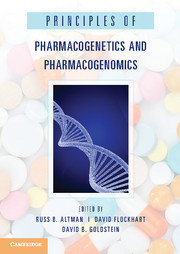Book contents
- Frontmatter
- Contents
- Contributors
- Introduction
- I Critical Concepts
- 1 Introduction to Population Diversity and Genetic Testing
- 2 Genotyping Technologies
- 3 Pharmacokinetics: Absorption, Distribution, Metabolism, Excretion Overview Chapter
- 4 Overview: Adverse Drug Reactions
- 5 PharmGKB, a Centralized Resource for Pharmacogenomic Knowledge and Discovery
- 6 DrugBank
- 7 Ethical Considerations for Pharmacogenomics: Privacy and Confidentiality
- 8 Informed Consent in Pharmacogenomic Research and Treatment
- 9 Legal Trends Driving the Clinical Translation of Pharmacogenomics
- II Therapeutic Areas
- References
8 - Informed Consent in Pharmacogenomic Research and Treatment
from I - Critical Concepts
Published online by Cambridge University Press: 05 June 2012
- Frontmatter
- Contents
- Contributors
- Introduction
- I Critical Concepts
- 1 Introduction to Population Diversity and Genetic Testing
- 2 Genotyping Technologies
- 3 Pharmacokinetics: Absorption, Distribution, Metabolism, Excretion Overview Chapter
- 4 Overview: Adverse Drug Reactions
- 5 PharmGKB, a Centralized Resource for Pharmacogenomic Knowledge and Discovery
- 6 DrugBank
- 7 Ethical Considerations for Pharmacogenomics: Privacy and Confidentiality
- 8 Informed Consent in Pharmacogenomic Research and Treatment
- 9 Legal Trends Driving the Clinical Translation of Pharmacogenomics
- II Therapeutic Areas
- References
Summary
Informed consent is an ethical and legal requirement for research on human subjects and the treatment of patients, as well. The process of informed consent provides an opportunity for the disclosure of material information and a structure for shared decision making that respects the autonomy of subjects and patients to decide whether to participate in research and to plan the course of their treatment. This chapter will describe the key elements of informed consent in research and clinical care in the context of pharmacogenetics and pharmacogenomics.
It is important to distinguish research from clinical care. Research is defined as “a systematic investigation, including research development, testing and evaluation, designed to develop or contribute to generalizable knowledge” (45 CFR § 46.102(d)). By contrast, clinical care or “practice” has been defined as “interventions that are designed solely to enhance the well-being of an individual patient or client and that have a reasonable expectation of success” (Belmont Report [1], 3). Although the definitions have been in place for several decades, new technologies and methodologies increasingly are blurring the distinctions. For example, translational research, case studies, outcomes research, quality improvement, and public health applications often present definitional challenges.
- Type
- Chapter
- Information
- Principles of Pharmacogenetics and Pharmacogenomics , pp. 74 - 80Publisher: Cambridge University PressPrint publication year: 2012



